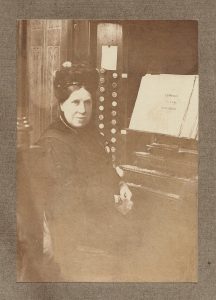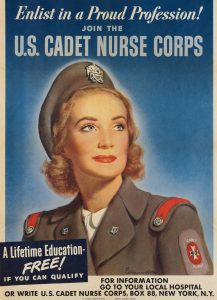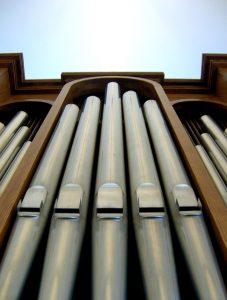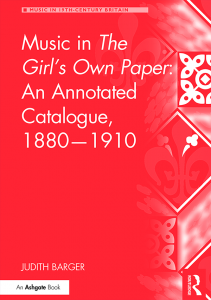‘Ladies Not Eligible’?:
Female Church Organists in
Nineteenth-Century England
Part 1
On 8 April 1865 the Musical Standard carried an announcement by the vestry of Saint John Southwark inviting ‘application from Gentlemen desirous of becoming CANDIDATES for the office of ORGANIST. Ladies, and persons afflicted with blindness, will not be eligible. 1 The linking of ladies with blind persons may have alluded to incapacities in women comparable to infirmities that, in the mind of an 1862 contributor to the Musical Standard, entitled the blind to compassion and assistance, but not to a position in which they might ‘do infinite harm by rendering the musical portion of our public worship uninteresting, if not ridiculous’. 2
In fact, the wording of the announcement ostensibly was intended to prevent harm to female organists, though the true motive remains suspect. When, at a vestry meeting, a letter was read from Kate Davis, organist of Saint John’s, resigning her position, a Mr Bradford proposed that the announcement in the public papers include the ineligibility clause, because he had heard it from a professional man ‘that it was absolutely injurious to the health of a female to play the organ at St. John’s’. 3
The decision of Saint John’s vestry to exclude women as applicants for its vacant organist position was not an isolated case. In 1853 Punch had taken up the cause of female church organists when it asked whether Saint Cecilia would be eligible for the recently vacated organist post at the church of Saint Helen Bishopsgate, given that the patron saint of organists was a woman. It is interesting that the 1853 announcement in The Times to which Punch referred was gender neutral in its wording, but Mr Punch had heard ‘that it is the practice of many vestries to exclude female candidates from competition for the organist’s office’ and wanted to spare Cecilia ‘the anxiety and trouble of making an application, in doubt whether or not it has been predestined to be fruitless’. Punch continued: ‘One would think that the church of a female saint would admit a female musician – or can it be that ST. HELEN would have closed her doors against her sainted sister, the namesake of Miss Punch, herself?’ 4
An announcement in 1854 advertising a vacant organist position at the Parish Church of West Hackney, with its stipulation that ‘Ladies are not eligible’, confirmed what Punch suspected and aroused the indignation of a letter writer to whom six years later, in 1860, the West Hackney announcement represented the degradation to which women still were subjected unjustly. The letter to the Musical World, signed A Seat-Holder at a District Church, decried the ‘unmerited and unmanly insult offered to our mothers, sisters, and wives’ which treated ‘the sex as inferior beings; it is un-christian and un-English-like’. The correspondent’s charge to popular writers nobly to employ their pens ‘in checking the progress of this increasing public evil’ went unheeded, at least in the contemporary music journals. 5 The pens of other writers, however, were not idle, as seen in a flurry of letters to the Musical World in 1857 and to the Musical Standard in 1863.
A letter signed A Clergyman asked readers of the Musical World in 1857 how it was that the announcements for parish organists appended the stipulation ‘No lady need apply’. He may not have anticipated that woman’s respectability would be offered in support of this blatantly discriminatory policy. He had cited the names of some of the most highly gifted organists of the time, among them Ann Mounsey Bartholomew, Elizabeth Mounsey and Elizabeth Stirling, as evidence that women could play the organ and conduct choirs as well as their male colleagues. A Clergyman asked, ‘Why should a really competent female be set aside (as is too often the case, to my own knowledge) for the sake of a less competent male, simply because she is female?’ 6
 Elizabeth Stirling (1819 – 1895)
Elizabeth Stirling (1819 – 1895)
Correspondent Oboe, who once had visited a woman organist in the organ loft during a service, was quick to respond to A Clergyman. He asked, ‘Do you, sir, think that it is a decent or proper profession for a lady to follow?’ 7
Yet another Oboe, who claimed to have been the first correspondent to use that pseudonym, asked the journal’s readers, ‘What business had this “gentleman” in the organ-loft during the service? Organists, when they visit a strange church, never rest until they have made their way into the organ-loft, there to tease and torment the unfortunate inmate.’ 8
The only woman to join the discussion chose to shift the focus from sex to skill. She asked the journal’s readers, ‘How does “Oboe” account for the fact, that almost always where ladies are nominated with gentlemen, to compete for appointments, and have played before professional umpires, they have been returned by them as competent to hold office.’ She said she was quite indifferent to the presence of a gentleman while performing her duties, and invited the imposter Oboe to a vacant seat in her organ loft ‘during any of the services, where he would hear an efficient choir, commenced and carried out entirely under my own direction, to the perfect satisfaction of the clergymen and the increasing congregation’. 9 Although, in the view of the journal’s editor, A Lady Organist had vindicated her sex modestly and appropriately in her letter, he nonetheless felt obliged to warn Oboe mockingly ‘not to accept this insinuating “invite” – unless he has no disinclination to a probable case of “Mrs. Oboe”’. 10
The sentiments of a letter writer who signed himself Pedal matched those of the imposter Oboe. ‘The organ is by no means a lady’s instrument,’ Pedal declared. He explained: ‘Their very dress is against them, since it impedes their pedaling.’ Not only was the act of raising one’s skirt a foot or so to facilitate pedaling unbecoming and immodest, correspondent Pedal claimed, the positions necessary to play the pedals were extremely indelicate, if not indecent. Pedal’s personal opinion of women discredited his supposedly professional argument against women organists, however, when he remarked parenthetically, ‘Bless their little hearts, may their eyes always look as loving, and their kisses be ever so sweet!’ 11
A letter signed A Metropolitan Churchwarden urged a stop to the prejudice against female organists, whom he preferred because they usually were more desirous than male organists to please clergy and congregation. Setting his own bias aside, however, the Churchwarden advocated equality of opportunity for organists of either sex. ‘Let us have the same privilege of testing their abilities, leaving it to the umpires to decide,’ he recommended. 12
In the issue in which the last of these letters appeared, the Musical World published a response, stating that it had heard enough of these futile, at times unfair arguments, which almost assumed ‘the form of a crusade against the fair sex’. Oboe, the editor pointed out, would have shown a better sense of decorum had he joined the congregation in worship instead of visiting the organ loft, or, if prayer was not his reason for attending the service, had stayed away altogether. Pedal was chastised for his immodest thoughts in church concerning a lady’s exposed ankles. The claims of correspondents such as Oboe and Pedal, the editor suggested, masked the real reason for their harangue: that organists far outnumbered churches, and that by eliminating women from competition, men would have a better chance of securing organist positions. 13
Yet women organists continued to secure organist appointments, much to the dismay of some of their male colleagues who, in the press, denounced women’s fitness to succeed in that occupation. Although the Musical World hoped the controversy had ceased in 1857, the topic resurfaced six years later in the Musical Standard in an equally heated debate about women organists – which is the topic of the next blog.
To be continued
Notes
1 ‘To Organists’, Musical Standard 1 (8 Apr 1865): 328. Saint John Southwark also was known as Saint John Horsleydown. For more about the ineligibility of women to apply for organist positions in nineteenth-century England, see Judith Barger, Elizabeth Stirling and the Musical Life of Female Organists in Nineteenth-Century England (Ashgate, 2007). The book is currently out of print, but copies are available in libraries and from used booksellers.
2 ‘On Choosing an Organist’, Musical Standard 1 (15 Aug 1863): 19.
3 ‘Elected Vestry of St. John’s Horsleydown’, South London Journal, 1 Apr 1865, 7b.
4 ‘Organist. – A Vacancy’, Times (London), 11 Nov 1853, 4d; ‘St. Cecilia and St. Helen’, Punch 25 (1853): 238.
5 ‘Organist Wanted’, Times (London), 10 Jun 1854, 2f. See also ‘Organist Wanted’, Musical Times 6 (15 Jun 1854): 89; A Seat-Holder at a District Church, ‘Church Organists’ [correspondence], Musical World 38 (11 Aug 1860): 513.
6 A Clergyman, ‘No Lady Need Apply’ [correspondence], Musical World 35 (29 Aug 1857): 553.
7 Oboe, ‘No Lady Need Apply’ [correspondence], Musical World 35 (5 Sep 1857): 586.
8 Oboe, ‘The Ass in the Lion’s Skin’ [correspondence], Musical World 35 (12 Sep 1857): 586.
9 A Lady Organist, ‘No Lady Need Apply’ [correspondence], Musical World 35 (12 Sep 1857): 586.
10 ‘Really some of our organists’, Musical World 35 (12 Sep 1857): 588; A Lady Organist, ‘No Lady Need Apply’, 586.
11 Pedal, ‘No Lady Need Apply’ [correspondence], Musical World 35 (12 Sep 1857): 585.
12 A Metropolitan Churchwarden, ‘No Lady Need Apply’ [correspondence], Musical World 35 (12 Sep 1857): 585.
13 ‘Really, some of our organists’, 588.



